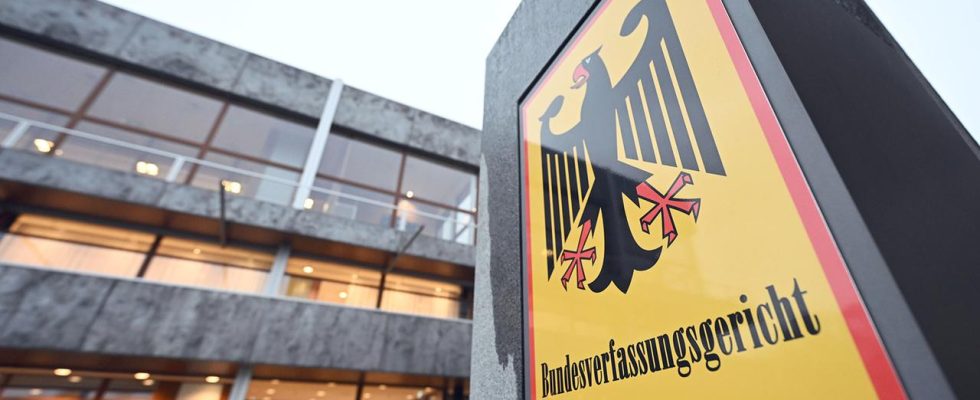In 2022, the traffic light coalition rededicated loans to deal with the corona pandemic into a climate fund. The Union saw this as a violation of the debt brake. Now the Federal Constitutional Court is hearing.
It was already 2022 when the budget for the previous year was changed again retrospectively – with the Second Supplementary Budget Act 2021. The Federal Constitutional Court in Karlsruhe must now clarify whether that was unconstitutional. Because the second supplementary budget was not only issued retrospectively, it also postponed the possibility of taking out loans in the amount of 60 billion euros. These 60 billion euros were not needed from the pot to deal with the corona pandemic. And so the traffic light coalition decided to use the money for climate protection.
The credit authorizations in the amount of 60 billion flowed into the “Energy and Climate Fund” – a special fund that now bears the name “Climate and Transformation Fund” and is managed separately from other federal assets. The funds are intended to relieve the burden on citizens and companies in particular when it comes to electricity prices. In addition, the billions should flow into ecological building renovation, electromobility and hydrogen technology.
Violation of the debt brake?
The Union faction in the Bundestag sees this shift as a violation of the debt brake regulated in the Basic Law. This was introduced in 2011. It is intended to ensure that the federal and state governments do not incur any new debt when the economy is normal. The federal government is then only allowed to borrow 0.35 percent of gross domestic product.
However, there are exceptions for natural disasters or other extraordinary emergencies that are beyond government control and have a significant impact on government finances. The Bundestag can then decide to exceed the credit limit. This is regulated in Article 115 of the Basic Law.
The Bundestag repeatedly identified such an “extraordinary emergency situation” in 2021 and 2022 due to the corona pandemic. And so in April 2021 the then grand coalition was able to increase the credit authorizations for dealing with the pandemic by a further 60 billion euros, which were later shifted to the climate protection fund.
Union faction complains
The members of the CDU and CSU in the Bundestag have applied to the Federal Constitutional Court for a norm review so that the second supplementary budget for 2021 can be reviewed there. Household funds should not simply be shifted from the Corona crisis policy to climate protection. Mathias Middelberg, deputy parliamentary group leader, sees this as a fundamental problem in the federal government’s budgetary policy. This is increasingly moving away “from a proper budgetary policy, which above all works annually,” said Middelberg in December 2022.
At the time, the Federal Constitutional Court had rejected an urgent application from the Union faction, which was intended to temporarily limit the use of the 60 billion euros – so that no money was missing from the federal budget in the short term. At the same time, however, Karlsruhe had indicated that it was critical of the traffic light coalition’s actions. It is “in any case not to be dismissed out of hand that the time of the adoption” of the second supplementary budget could violate the Basic Law – namely against the principle of “priority”.
The federal government counters that an allocation only in the 2022 budget would have resulted in a delay of several months.
Loans in reserve?
Union faction Vice Middelberg further criticizes that for the budgetary policy of the federal government “indefinite amounts of credit are taken out, which are then only needed in later years for actual financing”.
“A kind of supply management” in the federal budget and everything just “a trick” to then comply with the debt brake again in the coming years, says Middelberg. Bypassing the debt brake in this way has nothing to do with constitutional budgetary policy. “That’s what we’re essentially concerned with and not that we want to reduce funds for climate policy, or that we’re not willing to make funds available for gas and electricity price brakes or for lowering energy prices in general,” says Middelberg.
The federal government argues against this: In the energy and climate fund, too, the credit authorizations in the amount of 60 billion euros continue to be used to combat the consequences of the pandemic, because the funds are used to stabilize the economy.
Against this background, the Federal Constitutional Court will have to clarify to what extent the principles of annuality and annuality apply within the framework of the rules on the debt brake and whether they have been violated. The point here is that the budget is to be drawn up separately by year and that spending authorizations from a budget only apply to the respective year.
to clarify fundamental questions
The Karlsruhe judges want to use the procedure to deal with “fundamental legal issues that have not yet been clarified” when suspending the debt brake in emergency situations – and also with general principles of budgetary constitutional law.
The Bundestag last recognized an exception to the debt brake in June 2022 – this time also because of the effects of the Russian war of aggression on Ukraine. The loans should also be used to finance aid for companies and citizens, such as tax cuts and energy allowances.
The verdict, which is only due to be announced in a few months, will probably also be of fundamental importance for future budgetary policy.


